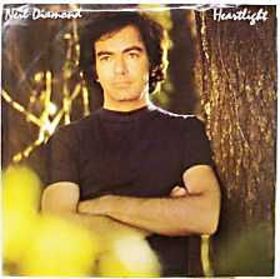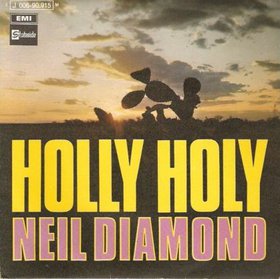
"If" is a song written by American singer-songwriter David Gates in 1971. Originally popularized by his group Bread, "If" charted at No. 4 on the U.S. Billboard Hot 100 when released as a single in 1971 and No. 6 in Canada. It also spent three weeks at No. 1 on the U.S. Easy Listening chart, and one week at the top of the Canadian AC chart.

"America" is a song written and originally recorded by Neil Diamond, released in 1980 on the soundtrack album of Diamond's film The Jazz Singer. The song was a hit single in the United States in 1981, reaching number eight on the Billboard Hot 100, and was Diamond's sixth number one on the Adult Contemporary chart. Billboard also rated it the #62 pop single overall for 1981. Although the single version was a studio recording, overdubs of crowd cheering simulate the feel of a live performance.

"Tell Me a Lie" is a song composed by Mickey Buckins and Barbara Wyrick. Originally recorded by Lynn Anderson for her 1974 What a Man My Man Is album, it was released later that same year as a single by Sami Jo Cole, who took it to number 21 on both of the major U.S. pop charts. It also charted in Canada (#17). Cole's version was also an Adult Contemporary hit, reaching number 14 in the U.S. and number 27 in Canada.

"Another Saturday Night" is a 1963 hit single by Sam Cooke from the album Ain't That Good News. The song was written by Cooke while touring in England when staying in a hotel where no female guests were allowed. It reached No. 10 on the Billboard Hot 100 and was No. 1 on the R&B chart for a single week. In the UK, the song peaked at No. 23 on the UK Singles Chart.

"Heartlight" is a song written by Neil Diamond, Carole Bayer Sager and her then-husband, Burt Bacharach, and recorded by Diamond in 1982. It is the first track on Diamond's 1982 album, also titled Heartlight, and reached number five on the Billboard Hot 100, becoming his thirteenth top 10 hit on the chart. It also spent four weeks atop the adult contemporary chart in late 1982, and was the last of his eight #1s on that chart. Reportedly, it was inspired by the 1982 film E.T. the Extra-Terrestrial, and Diamond allegedly settled with MCA/Universal for $25,000, due to its supposedly drawing on the material of the film.

"Song Sung Blue" is a 1972 hit song written and recorded by Neil Diamond, inspired by the second movement of Mozart's Piano Concerto #21. It was released on Diamond's album Moods, and later appeared on many of Diamond's live and compilation albums. The song was a #1 hit on the Billboard Hot 100 chart in the United States for one week, the week of July 1, and it spent twelve weeks in the Top 40. It also reached #14 on the UK Singles Chart.

"Holly Holy" is a song written and recorded by Neil Diamond with instrumental backing provided by the American Sound Studio house band in Memphis. Released as a single on October 13, 1969, it was a successful follow-on to "Sweet Caroline", reaching #6 on the U.S. pop singles chart by December. The song also reached #5 on the Easy Listening chart. It became a gold record and then eventually a platinum record.

"My Melody of Love" is the title of a popular song from 1974 by the American singer Bobby Vinton. Vinton adapted his song from a German schlager song composed by Henry Mayer, and it appears on Vinton's album Melodies of Love. The song was also recorded by Spanish pop singer Karina as "Palabras de Cristal".

"Love or Let Me Be Lonely" is a pop song recorded by the soul group The Friends of Distinction and released as a single in early 1970. The song was a multi-format success, peaking in the top 10 of the Billboard Hot 100 at #6 on May 1, 1970 and at #13 on the R&B chart. On the Adult Contemporary singles charts, "Love or Let Me Be Lonely" went to #9. The song is ranked as the 63rd biggest hit of 1970.

"Yesterday's Songs" is a 1981 single by Neil Diamond from his album On the Way to the Sky. The song was a major adult contemporary radio hit, spending six weeks at #1 on the U.S. Billboard chart and four weeks atop the Canadian Adult Contemporary chart. On the Billboard Hot 100, it peaked at #11. On the Canadian pop charts, the song reached #15. "Yesterday's Songs" is ranked as the 77th biggest American hit of 1982.

"If You Know What I Mean" is a song written and recorded by Neil Diamond. It is a track from Diamond's 1976 album, Beautiful Noise, and was his third number 1 on the Easy Listening chart, where it spent two weeks. "If You Know What I Mean" went to number 1 for two nonconsecutive weeks and peaked at number 11 on the Billboard Hot 100. In Canada, the song reached number 19 on the pop singles chart and hit number 1 on the Adult Contemporary chart.

"Desirée" is a 1977 song written and recorded by Neil Diamond and included as a track on Diamond's 1977 album, I'm Glad You're Here with Me Tonight. The single peaked at number 16 on the Billboard Hot 100 and reached number one on the U.S. Easy Listening chart to become his fifth number one on that chart. The song likewise reached number one on the Canadian AC chart.

"Where Were You When I Was Falling in Love" is a popular song written by Jeff Silbar, Sam Lorber and Steve Jobe. It was a hit for singer Lobo and was released as a single in 1979 from his self-titled album.

"Stormy" is a hit song by the Classics IV released on their LP Mamas and Papas/Soul Train in 1968. It entered Billboard Magazine October 26, 1968, peaking at #5 on the U.S. Billboard Hot 100 chart and #26 Easy Listening. The final line of the chorus has the singer pleading to the girl: "Bring back that sunny day". The single, along with the prior release of "Spooky" and, soon after, the release of "Traces", formed a trio of solid hits for the band.

"Love in the Shadows" is an uptempo pop song written and recorded by Neil Sedaka. The song became an international Top 20 hit in 1976.

"We're in This Love Together" is a 1981 hit song by Al Jarreau. It was the first of three single releases from his fifth studio album, Breakin' Away. The song was his first and biggest chart hit.

"Could You Ever Love Me Again" is a 1973 song recorded by Gary and Dave. It became their greatest hit, reaching #7 in Australia and #1 in Canada. It was also a minor hit in the United States.

"Rainy Jane" is a song written and originally recorded by Neil Sedaka in 1969, covered two years later by Davy Jones. Sedaka's rendition became a minor hit in the U.S., Canada and Australia.

"I Got to Know" is a song recorded by the American band Starbuck. It was the second of three singles from their debut LP, Moonlight Feels Right. Written and produced by Bruce Blackman, the song was released in September 1976. Like its predecessor, "Moonlight Feels Right," the song features a prominent marimba solo by co-founding band member Bo Wagner.

"The Drum" is a song recorded by Bobby Sherman from his Portrait Of Bobby LP. It was released as a single in the spring of 1971, the second of two from the album. The song was written by Alan O'Day, his first of five Top 40 chart credits.




















